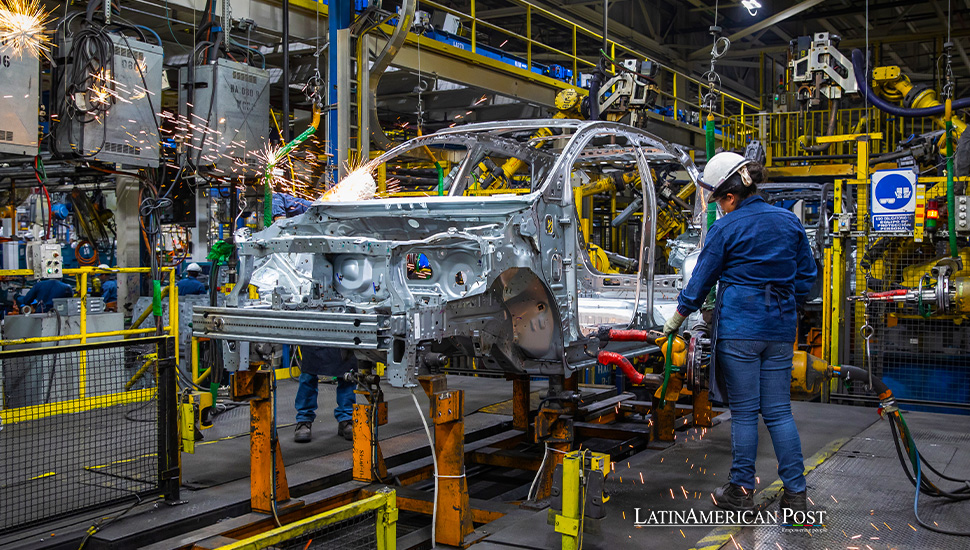General Motors Announces Major Investment in Brazil’s Automotive Sector

General Motors commits to investing 7 billion reais ($1.42 billion) in Brazil by 2028, marking a significant move to rejuvenate sustainable mobility and revamp its vehicle portfolio in South America’s biggest economy.
GM Unveils Ambitious Investment Plan for Brazil
General Motors (GM) has announced a substantial investment plan for Brazil, totaling 7 billion reais ($1.42 billion) to be injected into the country’s automotive industry until 2028. This strategic move signifies GM’s commitment to spearheading sustainable mobility initiatives and revamping its vehicle offerings in Latin America’s largest economy.
The investment will enable a “complete renewal” of GM’s vehicle portfolio in Brazil. This implies a revamp of current models and the potential development of new technologies and business ventures. The company, however, did not specify a timeline for the commencement of electric and hybrid vehicle production in Brazil, indicating that such decisions hinge on the evolution of the local market.
This investment announcement arrives at an opportune moment for Brazilian President Luiz Inacio Lula da Silva’s administration, which has been ardently working to revitalize the nation’s domestic industry. Lula has welcomed GM’s decision, highlighting the investment’s anticipated positive impact on economic development and social inclusion within Brazil.
Complete Overhaul of GM’s Vehicle Portfolio
GM’s investment is part of what the company describes as the first phase of a new investment cycle in Brazil. The goal is to bolster the company’s competitiveness and ensure the sustainability of its operations and products. This focus on sustainability aligns with a global shift in the automotive industry towards greener and more environmentally friendly practices.
The announcement comes in the wake of labor unrest at GM’s factories in Sao Paulo state, where workers protested against the layoff of 1,245 employees. These layoffs were reversed following a court ruling, highlighting GM’s complexities and challenges in the Brazilian market.
Fabio Rua, GM’s Vice President for South America, addressed the layoffs in response to a “specific juncture” last year. He emphasized that GM’s long-term vision for Brazil is growth and continued employment, signaling its commitment to its workforce and operations.
GM’s Commitment to Sustainability
GM’s investment in Brazil represents a significant South American automotive industry development. It indicates the growing importance of the Brazilian market in the global automotive sector and GM’s recognition of this potential. The investment could catalyze further foreign investment in Brazil, potentially leading to a more dynamic and competitive automotive industry.
This investment is not just about expanding GM’s market share or product line; it’s about adapting to the changing demands of the automotive industry. With a global push towards sustainable and eco-friendly transportation solutions, GM’s focus on developing new technologies and business models in Brazil is timely. It positions the company as a leader in the transition towards sustainable mobility in Brazil and the broader South American region.
Moreover, the investment is likely to ripple effect on Brazil’s economy. It could lead to job creation, stimulate local supply chains, and encourage technological advancements within the country. This could have positive implications for Brazil’s overall economic growth and development.
Navigating Challenges
However, the investment also brings challenges. GM must navigate Brazil’s complex regulatory environment and address labor relations, as evidenced by the recent strike. Additionally, the company will need to stay attuned to Brazilian consumers’ evolving needs and expectations, particularly as the market for electric and hybrid vehicles expands.
Also read: Mexican Business Community Urges Completion of Pension Reform
General Motors’ investment in Brazil marks a significant milestone for the company and the Brazilian automotive industry. It reflects a strategic shift towards sustainable mobility and technological innovation, aligning with global trends in the automotive sector. As GM embarks on this ambitious journey, it will play a crucial role in shaping the future of sustainable transportation in Brazil and beyond, fostering economic growth, technological advancement, and environmental sustainability.





